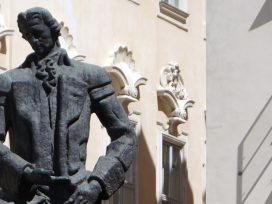It is almost unquestionable that throughout history educated classes have always adhered to dictatorial regimes. Plato and his failed ‘mission’ in service of Dionysius I, tyrant of Syracuse, bequeathed us the Seventh Letter . This legendary episode is often taken as a metaphor for all philosophers and artists of the 20th century who were impressed by leaders and politics crossing the boundaries of democratic boredom. Notwithstanding, it is somewhat peculiar that the absolute moral guilt of visiting Syracuse has always been ascribed to the greatest thinker of the 20th century – Martin Heidegger – while the cases of Knut Hamsun and Ezra Pound, although considered amoral, have nevertheless been regarded as completely benign compared to that of the master thinker. It is today most difficult to find literature describing and interpreting political delusions of the great novelist and poet. On the other hand, Heidegger’s marveling at Adolf Hitler’s ‘hands,’ in the words of Jaspers, who accused Heidegger of allegiance to Nazism, still serves as an inspiration. One could say that dealing with Heidegger’s short adherence to Nazism during his vice-chancellorship in Freiburg in 1933/34 represents a certain universal (moral) examination of conscience for the entire western culture. In the spirit of Hegel’s maxims, philosophy is in this way unintentionally placed above all sciences and human skills. This happens regardless of the fact that the end of the 20th century was definitely marked by Warhol’s maxim about the artist (the philosopher included), who is but one of many in the business of the world.
In spite of the studies written by Bourdie, Pöggeler, Farias, Safransky, it seems that the Heidegger case remains open. Nevertheless, this does not mean that boredom has gained supremacy and that historical revisionism will dilute this episode as unnecessary for the understanding of Martin Heidegger’s thought world and political views. However, it has lately been easy to notice that most studies are trying to grasp the meaning of Heidegger’s political engagement beyond the vulgar accusation that he was nothing more than a regular Nazi. Two books written by philosophers of the younger generation – Miguel de Beistegui ‘s Heidegger & political Dystopias (Routledge, London-New York 1998) and Julian Young ‘s Heidegger, philosophy, Nazism (Cambridge University Press, 1997), stand out as most provocative studies. These books should be critically discussed if we wish to find the answer to the central question raised in this paper: is it possible to talk about Heidegger’s understanding of politics and political engagement as such, from the perspective of Heidegger’s idea of the western metaphysics and its particular turn? Moreover, can Heidegger’s thinking still be preserved as a life-saving chant in the overall nihilism of virtual civilization?
Miguel de Beistegui is a professor of philosophy at the University of Warwick. His study on Heidegger and political engagement written from the point of view of understanding political as such, belongs to the tradition of new German historiography, since it is trying to consider the notion of political in relation to politics, in accordance with the famous book by Christian Meier , Die Entstebung der politischen bei den Griechen . The rigidity of execution and the faithful following of the idea of political and politics in Heidegger make this work stand together with pieces written by Löwith, Bourdie and Pöggeler. Beistegui is trying to understand Heidegger’s political engagement in service of Nazism, by pondering upon his idea of politics in general. The real question is whether this is possible in the first place, since Heidegger left only a few fragments written on politics and society (useless to the philosophy of politics), found in Sein und Zeit and in some of his lectures on great metaphysicians of the West. Therefore, Beistegui is trying to correlate Heidegger’s destruction of traditional ontology with the issues of border-lines between peace and politics in the speech of Heidegger himself. Three methodological approaches have taken root since the beginning of analyzing the Heidegger case. They are, of course, cognitively relevant, as well. The first approach claims that Heidegger’s political engagement during Nazi regime was the result of his philosophy. The second says that it is all only about moral and civil allegiance, as a form of human and political opportunism. The third approach believes that Heidegger failed and went astray into politics, of which he soon grew tired. There is also a fourth approach, which today seems least credible, saying that Heidegger gave some sort of esoteric criticism of Nazism. It could be said that Miguel de Beistegui’s is the first approach. However, he rejects Farias’s accusation that the thinker of the turn of metaphysics was but a small, provincial Nazi. In the foreword to his book, Beistegui explicitly states that he wishes to lay out the following thesis obtained from Heidegger’s radical criticism of metaphysics and modern times in general: we have before us a philosophical answer to the question about the sense of political engagement. In this respect, the entire interpretation is more inspired by the works of authors who focused on Heidegger’s understanding of community and politics, than those interpreters who ideologically rejected him as an eminent Nazi thinker. Beistegui presents Heidegger’s reception in the United States in detail, in view of his political engagement that was in the liberal democratic tradition always confronted with more benevolent attitudes of the English or Italians, or even the French, gathered around Heidegger’s friend Jean Beaufret and great surrealist poet and anti-fascist Rene Char.
Miguel de Beistegui openly admits that his main problem with articulating Heidegger’s attitude towards the Nazi politics is an attempt to clarify and phenomenologically understand the notion of here-being ( Dasein ) in the part on historicity in Sein und Zeit . Nevertheless, he rejects Adorno’s serious accusation that Heidegger’s thinking is therefore basically “fascist in its innermost components.” Since there is no explicit political philosophy in Heidegger, it is obvious that we must first see why the modern man’s experience of being without home creates conditions for a different notion of politics, beyond enlightening tradition and liberalism. For Beistegui, ‘political’ paves the way for the organization of being, the original place of openness towards an event. This is why decisionism and political romanticism are close to Heidegger’s existential decision, but are by no means his philosophical credo of political. In the openness of political, Heidegger, according to Beistegui, always contemplated something fatefully different from the politics of interest, something more fundamental, stemming from historical disclosure and the absence of being and time. This remained untouched until the closure of his thoughtful life, if we bear in mind that Heidegger held all great ideologies in the 20th century – fascism, bolshevism, and Americanism – insufficient and futile when overcoming the experience of nihilism.
In spite of a meticulous interpretative procedure that should provide Heidegger with a positive relation toward political, Beistegui is groping in the dark of the inexpressible and unutterable Heideggerian ‘jargon’ on politics and political. ‘Black holes’ appear in his interpretation, especially when Beistegui is looking for the starting point of the so-called topos of original politics in Plato ‘s Politea and Aristotle ‘s Politics . This happens because Heidegger believes political, as well as anthropology, to be derived from the basic metaphysical happening of being and time in past history, although the real question is whether Heidegger follows through the notion of political in the first place. Heidegger is not concerned with rebuilding the polis, since this is essentially impossible to do. After the experience of nihilism and the unconditional rule of technology over mankind, various forms of political engagement (when it comes to the renewal of the polis) belong to the nostalgia of practical philosophy that could never ‘steal’ anything from Heidegger and use it for its purposes.
Yet another difficulty arises when political is pondered upon while circling around Heidegger’s later idea of occasion ( Ereignis ) in accordance with Greek pre-metaphysical thinkers and romantic poet Hölderlin. All pathways leading into the secret of Heimweg , Heimat and Heimkunft are not plausible as possibilities of establishing Heidegger’s political ‘position’, although they are subtly disclosed by Miguel de Beistegui beyond the abuse of the conservative revolution of German right-wing political ideologists. This does not reduce the value of authorial work. Nevertheless, it still remains unexplained why the following question is never raised: if we take up the aforementioned first approach to the Heidegger’s case, how come that the being-historical thinking lacks historical subject matter of political as something ‘positive’. The only philosopher of the 20th century who in a consistent manner lived through the ‘end of philosophy’ could not see from his perspective a single manifestation of politics as a continuation of modern subjectivism in democratic games about power and rule.
Hans-Georg Gadamer brilliantly interpreted Heidegger’s erring voyage to Syracuse, by placing the essence of political engagement in the fall of the philosopher, below the level of thought experience. This experience was in the course of the 20th century undoubtedly the most radical of all ideologies against technical nihilism and footlessness of mankind. In other words, Heidegger would have not been embraced by leftists and anti-fascists if he had been nothing but a “damn Nazi fiend.” If we use the Heidegger’s case to erase the sins of philosophy in its absolute engagement, as it used to be done since Plato until Marx, why ascribe more to Heidegger than any philosopher and man (as the embodiment of philosophy) deserves? Indirectly, this is the question about the border-lines of philosophical understanding of politics in the so-called meager times, which Beistegui himself admits, as well. Moreover, the question whether Heidegger can be regarded as a contemporary thinker of political, from the point of view of here-being in his historicity, is also most disturbing. In other words, what does it mean to think beyond epochal borders? All those who today celebrate the ‘progress’ in philosophy, forget that Heidegger made a ‘turn’ against metaphysical tradition when he proclaimed Heggelian progress to be the end of philosophy. Thinking required a step back after this, not as nostalgia and renewal of something essentially past, but as an opening up of new horizons. There is no doubt that the self-deception of a non-political individual (to borrow the title of political memoirs by Thomas Mann, who wrote about the tragic period in German history during Nazism) like Heidegger, was great and could never completely be ‘morally’ redeemable.
Nevertheless, where could one, in the modern world, find a way to overcome homelessness, if the nihilism of technology is seen as the single joyful reality? On the other hand, Heidegger’s thinking was substantially different from directions before action and general computational character of modern metaphysics. Contemplating the notion of political eventually ended up in poetic figures of speech. In other words, Miguel de Beistegui’s study does not offer anything spectacular. It does not even get carried away by the pathos of deconstructing Heidegger’s thinking. This is, actually, its greatest value, even when it is dealing with the most inexpressible notion of political in Heidegger. In Heidegger’s case, unpresumptuous intentions are more of use than a loud judgement, since he continues to intrigue philosophers at times when dictatorships and farce are mysteriously yet intimately related.
Julian Young expresses his ideas in a similar manner, although emphasizing the politicization of Heidegger in a ‘story’ about the overcoming of history. A professor of philosophy at the University of Auckland, Young is the author of well-received studies on Schopenhauer and Nietzsche, published by Cambridge University Press and Nijhoff. His study bearing a somewhat rigid title Heidegger, philosophy, Nazism , is most interesting since it follows recent investigations on the Heidegger case – conducted by Sluga, Safransky, Kraus, Beistegui – that openly reject the causative theory about the inseparability of Heidegger’s thinking and his submissiveness towards the Nazi politics. The scandal began with a book by Victor Farias and caused much damage to the objective attempt at interpreting an ambiguous relationship between the most complex philosophical thought of the 20th century and a totalitarian ideology embodied in the rise of Nazism. Young has shown that he knows the main streams in the interpretation of Heidegger’s thinking exceedingly well. At the same time, and in relation to the subject matter, he has presented a variety of keys to the mystery of the odious thesis on Heidegger’s marveling at Hitler’s hands as a representative essence of new great politics. Those researchers working on Heidegger’s political engagement, before they produce any statement about the subject matter, always inevitably end up in a situation where they have to identify themselves. They also have to find out whether they are nothing more than ideologists in service of an imaginary critical theory of society, followers of a new metapolitical right wing, or whether they are simply studious researchers whose possible liberalism is never of great importance for their work.
Young’s basic thesis focuses on the de-Nazification of Heidegger. The author himself is aware that this idea can create misunderstandings and even produce dogmatic interpretations. For this reason, he first expresses it as a historical, deconstructive and analytical notion. In the first case, we are dealing with a comparison of two stories (the official and the unofficial story) that have been used as explanations of Heidegger’s political engagement. The first story is the one Heidegger told (with reliable self-understanding) in an interview to Rudolf Augstein for the Spiegel . This story has been known in Croatia for a long time. Vanja Sutlic defended this position in his interpretation of the thinker and politics under the heel of totalitarianism, seeing it as obliging. In short: in the interview under a strange editorial title “Only one God can still save us”, Heidegger advocated external self-criticism of his own delusion. Commitment to nationalist socialism as a political option resulted from an alternative to the destructive spirit of the Weimar liberalism and the danger of the ghostly Bolshevik revolution. Disappointment in the ‘movement’ occurred as soon as it was taken over by primitive and barbaric individuals, who directed it towards the outburst of racism and biologism in its worst imaginable form.
After his vice-chancellorship, Heidegger turned to philosophical criticism of the movement, as he lectured on Nietzsche and metaphysics. Finally, the conclusive proof of his inner dissidence is the regime’s aversion towards his name, his nonparticipation in philosophical conferences, his anonymous participation in public works, etc. Unofficial history, however, claims that Heidegger’s opposition towards the Nazi regime was not at all evident. Moreover, it seems that this opposition could have been made up and overblown. This unofficial story began with Farias’s book, encouraged by documents gathered by Hugo Ott, and culminated in documents collected by Guido Schneeberger under the title Nachlese zu Heidegger . The story is all about Heidegger’s compromising speeches that he gave as vice-chancellor. Statements uttered in those speeches are more often than not like the one calling Hitler “the only German reality and law.” This story shook up the previous, official version describing how Heidegger accepted Nazism only for a short time and due to his political blindness and conservative approval of the Heimat ideology, but without any grave moral consequences. For this reason, while he is working on the thinker’s de-Nazification, Young does not radically doubt the documents that compromise Heidegger. Moreover, he does not deny the evidence of Heidegger’s political opportunism. In order to understand why Heidegger has to be de-Nazified in the first place, one must clarify yet another concept: the one that we have before mentioned as the deconstructive analytical concept.
Young’s estimate is that the marveling of researchers, himself included, at Heidegger and Nazism is in a fascinating disproportion of an epochal “philosophy of being” with the paradigm of evil. This is why at least at some point in Heidegger’s thinking Young has to find indications of the forthcoming Nazi breakthrough. Young’s thesis seems to be tautological from the beginning: he wishes to prove that Heidegger’s thinking had nothing to do with Nazism. Is this something completely new? Of course not. Nevertheless, it deals with the deconstruction of the other, unofficial history, that can create, as it has already created, a different view on Heidegger as a philosopher of deconstruction of traditional ontology, or simply, as a thinker with a pivotal role in the epoch.
Young is aware that all Adornos were familiar with the ideological interpretation of Heidegger as a crypto-Nazi, and that Habermas, who wrote the foreword to the second, German edition of Farias’ book, directed his criticism in the same way. This is exactly why it seems that the banality of the thesis expressed by Young in his study, is worth interpreting. This is the reintroduction of Heidegger into the purity of his work that no new evidence of his delusions and opportunism can ever again question. After all, Safransky ‘s monograph Ein Meister aus Deutschland: Heidegger und seine Zeit perhaps in the best way speaks of the problem without challenging the outstanding quality of the so-called unofficial history. As much as Young’s intention is innovative, it can at the same time be described as old wine in new bottles. What makes it interesting is its brushing away the interpretative cobwebs around Heidegger’s political engagement. In this connection, its only ‘innovativeness’ is in the fact that, while deconstructing the politicized Heidegger, it does not fall under the influence of Heideggerian hagiography of the so-called official history.
Young is passionately trying to prove that the character of Heidegger’s political engagement was inconsistent with the deepest philosophical conviction of the spirit of the time. Consistently with his criticism of metaphysics, because of which he rejected political science as ideology, Heidegger regarded politics as something pondered upon from the perspective of making real a new historical complex of being and time. Therefore, it carried signs of decisionism and metaphysics. It was a strange concept of political romanticism and activism, regarded by many theoreticians as similar to the engagement of Ernst Jünger, since they saw it in the light of analyzing the phenomena of conservatism and the end of the 20th century. Young refers to a few recent analysis of Heidegger’s understanding of politics, especially to the ideas of Hans Sluga in his book Heidegger’s Crisis: Philosophy and Politics in Nazi Germany (Cambridge, Harvard University Press, 1993). He believes that the distinction between philosophical thinking and Heidegger’s political ideology stems from the relation between high modernism and reactionary political romanticism. We should pause here. That is to say, Hubert Dreyfus from Berkley University, who is one of recent researchers on the same subject, describes Young’s book as innovative in the sense that it unmasks Heidegger as a certain defender of a communitarian ideology that today, alongside liberalism, seems to be the most influential theory in political sciences. There is no doubt that political romanticism and the notion of ‘home’ are indirectly close to the communitarian concept of the community. However, the difficulty with Young’s book and Dreyfus’s review is that they both have as their starting point, a thesis that is hard to prove; they both claim that the de-Nazification of Heidegger can uncover his implicit criticism of the totalitarian Nazi politics.
Communitarianism is a foreign body of Heidegger’s political engagement. As Carl Schmitt defined it in his treatises, Heidegger was familiar with the inclination toward a sort of decisionism and political romanticism, but he did not pay any special attention to it. Every historical philosophical research, and this is exactly what Young’s study is trying to be, has to restrain from external analogies, even when this, due to a lack of direct proof, creates an atmosphere of mystical bonds between the thematic time and the time of the researcher’s discourse. Hermeneutics in its original essence of text interpreting, as it was once nicely expressed by Heidegger himself, is an attempt at harmonizing bells ringing from the tops of different hills. If there is no harmony in music, then the bells are not well-tuned. The interpreter of the tradition has a great responsibility when creating this harmony. Young’s book with its emphasized program of “Heidegger’s de-Nazification” is a contemporary portrait of the state with a reception of Heidegger’s political engagement. Borderlines of such a portrait are set by the greatness of the subject matter and its ideologization. This is why it is obligeable to make an attempt at avoiding the ideological approach to the subject matter of philosophy and evil, as regards Heidegger’s relationship with Nazism. Nevertheless, it is possible to recognize in it a concern about interpreting something that not even Heidegger saw as a positive problem of political sciences or the philosophy of politics. This is first and foremost a question of political or politics as a tragic fate of here-being within a community.
Heidegger cannot be de-Nazified (if he has to undergo this project of ‘purification’ in the first place) in such a way that he is ‘lured’ into thinking in a communitarianist fashion. Delusions of a non-political one were far away from those of today’s theoreticians concerned with the return to the ideal of the small community that will never run through the wringer of shapeless mass democracy, where, in spite of the renewal of liberal postulates, the ideas of freedom and republicanism are turning into illusions. Heidegger’s pseudo-poetic vision of community was after all imprisoned by a mystical reading of Hölderlin’s longing for the genuine Greece – the homeland of gods, heroes and thinkers.






